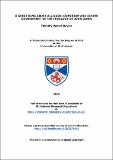A great king above all gods : dominion and divine government in the theology of John Owen
Abstract
Scholarship has tended to depict John Owen as a “Reformed catholic” attempting a synthesis of Reformed principles with a largely Thomist doctrine of God. In this thesis, I argue that this depiction risks losing sight of those aspects of Owen’s doctrine of God that are intended to support a distinctly Protestant account of the economy of grace. By an examination of the principles of divine government, I argue that Owen employs the theme of God’s “dominion” in order to establish the freedom and gratuity of God’s grace, and to resist theologies that might otherwise use the doctrine of creation to structure and norm God’s government of creatures.
In chapter one, I argue against prevailing readings of Owen’s thought that his theology of the divine will is, in fact, “voluntarist” in nature, prioritizing God’s will over his intellect in the determination of the divine decree. I show that Owen regards God’s absolute dominion as an entailment of his ontological priority over creatures. Chapters two and three examine the character of God’s dominion over creatures in virtue of their “two-fold dependence” upon him as both Creator and Lawgiver. Chapter four takes up Owen’s theology of God’s remunerative justice in the context of his covenant theology. I show here that his doctrine of divine dominion underwrites his critique of merit-theology and attempts to establish the gratuity of that supernatural end to which humans are destined. Finally, in chapter five, I examine the principles of God’s mercy, expressed in the work of redemption, where I demonstrate how Owen’s conception of divine dominion underwrites the freedom of God in election and his account of particular redemption.
Type
Thesis, PhD Doctor of Philosophy
Collections
Items in the St Andrews Research Repository are protected by copyright, with all rights reserved, unless otherwise indicated.
Related items
Showing items related by title, author, creator and subject.
-
Responsive and imaginative participation in divine revelation with particular reference to the epistemology of Michael Polanyi
Clark, Tony (University of St Andrews, 2005) - ThesisThe Christian church proclaims that God has made himself known. It is the task of a doctrine of revelation to offer an account of this claim. In this thesis we take Karl Barth's doctrine of the Word of God as our point of ... -
Divine action, Christ and the doctrine of God : the trinitarian grammar of Adolf Schlatter's theology
Loos, Andreas (University of St Andrews, 2006) - ThesisThis dissertation constitutes an examination of the inner-theological basis of Adolf Schlatter's theology which, as recent research has established, needs to be understood in terms of a theology of God's works. The ... -
God's shining forth : a trinitarian theology of divine light
Hay, Andrew R. (University of St Andrews, 2014-12-01) - ThesisThis thesis seeks an orderly set of theological reflections on the declaration that “God is light” (1 Jn. 1:5). Such talk of divine light, this study argues, must begin with the doctrine of God, namely, with God’s light ...

